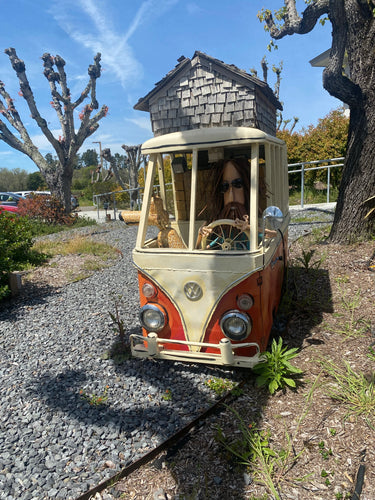
On the Road: The VW Bus Journey That Fueled Social Change at Traditional Medicinals
An interview with Drake Sadler Co-Founder, Chair of the Board of Directors, Traditional Medicinals
Let’s talk about a key moment in Traditional Medicinals’ history—your
VW bus journey. How did that come about?
Drake Sadler: It was the mid-1970s, and Rosemary Gladstar, my co-founder, and I were planning a trip to Mexico. I wanted to surf, and Rosemary was eager to study Mexican herbalism. To fund our travels, I packed up my yellow VW van with 10,000 bags of tea and calendars from a small print shop I ran at the time, thinking I’d sell them along the way to cover our expenses.

That sounds like quite an adventure! How did the sales go?
Drake Sadler: It was pretty incredible. I drove up and down the coast, stopping at
small shops to sell the tea, and before I knew it, I had sold out—10,000 bags, gone! Even better, stores started asking where they could reorder, and I hadn’t even planned for that. I returned home with a stack of reorder forms and realized that we had something much bigger on our hands than just a local tea business.
That sounds like the moment Traditional Medicinals really started to grow. But how did that lead to the company’s focus on ethical sourcing?
Drake Sadler: Yes, that was the turning point. As we grew, we needed more herbs. One day, during a supplier pickup, I asked where the herbs were coming from. The supplier told me, “You don’t want to know.” Naturally, that made me curious, so I went to see for myself. That led Rosemary and me to Guatemala, where we saw firsthand the harsh conditions of the source communities.
What was your reaction to what you saw?
Drake Sadler: It hit me hard. These communities lacked access to basic health,
economic, and educational resources. I couldn’t, in good conscience, continue our business without addressing these conditions. I turned to my mentor, Mrs. Sloan, for advice. She reminded me to use the business as a vehicle for social change. She said, “Your values can drive the solution.”
And that’s when the shift happened?
Drake Sadler: Exactly. From then on, we were committed to not just sourcing herbs but partnering directly with these communities. We decided that if we used a supply partner, we’d first visit the source community and ensure that any development was led by the people themselves. That approach — putting people first and working in partnership — became a cornerstone of Traditional Medicinals and is still part of our DNA today.





